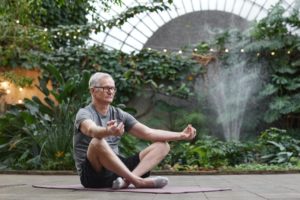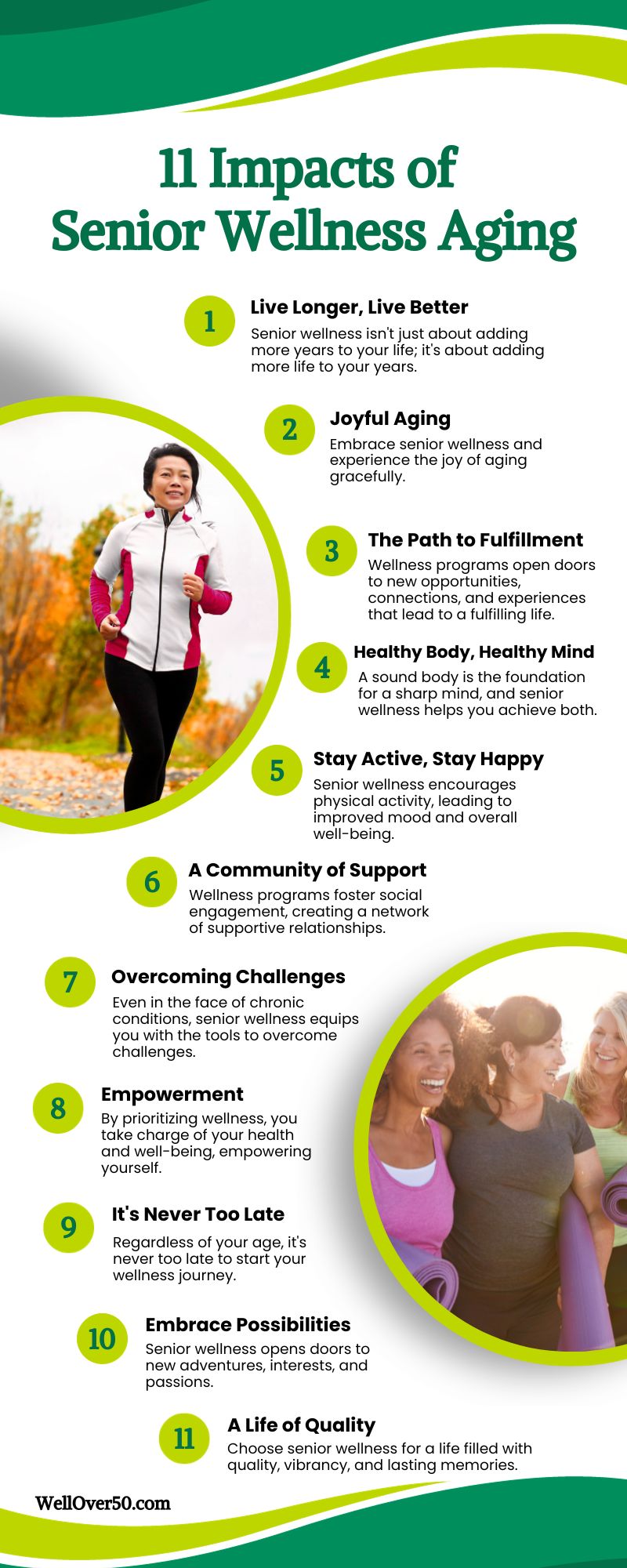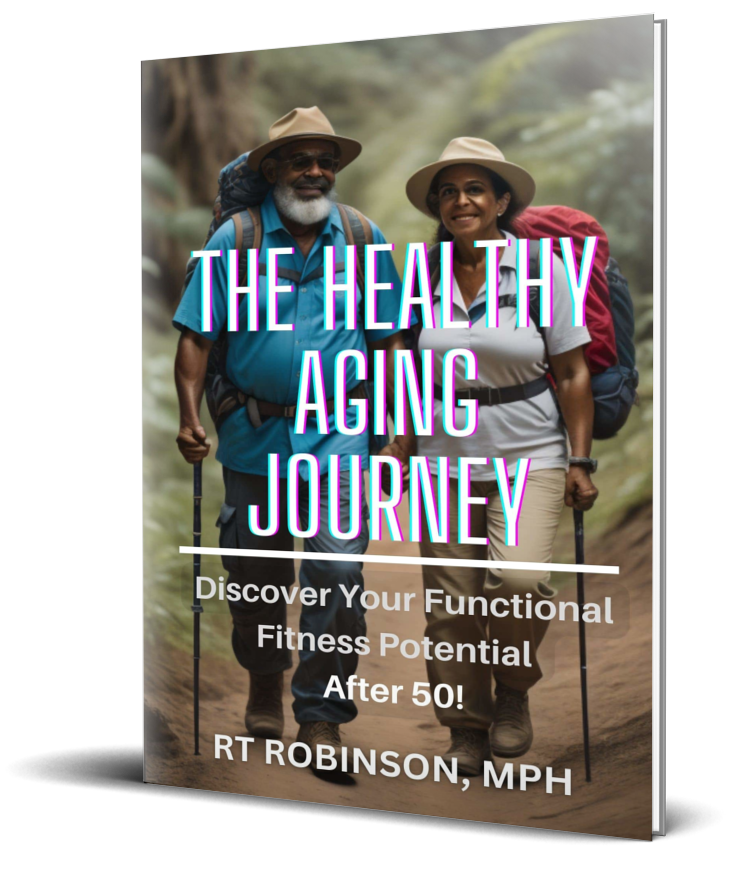
Embrace the Idea of Healthy Aging Now
Healthy aging is an inevitable part of life, but you will discover your path to doing it gracefully and enjoying the experiences of redefining your purpose in life while maintaining your physical, mental, and emotional well-being.
In this comprehensive guide, we will address the concerns and mental, or emotional, roadblocks to healthy aging for seniors and delve into the positive outlook on healthy aging for seniors.
From embracing the idea of aging with vitality to the importance of senior wellness programs, we'll explore all the aspects that contribute to a fulfilling and vibrant life in your golden years.
Many of us never think about aging until we have reached a certain milestone in life and we appear to be slowing down. Whether it be wisdom, health concerns, or nurturing a legacy, we discover that we need to exhibit healthier behaviors if we plan on sticking around to enjoy our retirement days.
Have you ever stopped and thought about the importance of healthy aging? It's easy to ignore until it becomes a reality and we start experiencing the effects of aging. But why wait until then?


Healthy Aging vs Senior Well-Being
Healthy aging is a crucial aspect of senior well-being, encompassing physical, mental, and social health. Maintaining independence and daily normal functioning are critical aspects of healthy aging and are key to an aging individual’s mental health. It's about maintaining a high quality of life as we age, allowing us to remain independent, engaged, and fulfilled.
Healthy aging is not something to fear or dread; it's an opportunity for personal growth and wisdom. Here are a few key mindset shifts to kickstart your journey to healthy aging:
Embrace Change, Not Resistance

Change is an inevitable part of life, and as we age, it becomes more important than ever to embrace it rather than resist it. Many people may not even realize how much change has affected their lives until it becomes drastic and impossible to ignore.
The first step towards healthy aging for seniors is to recognize and accept that change is a natural part of the aging process and to
Resisting change can only lead to frustration and hinder our ability to navigate the challenges that come with healthy aging. Rather than clinging to the past, it is important to educate ourselves and proactively address these changes. By embracing change, we can open ourselves up to new possibilities and embrace the change in our lifestyle to ensure long-term health and happiness.
By reframing our perspective on healthy aging for seniors, we can
Impacts of Senior Wellness on Healthy Aging
Understanding the concept of senior wellness and its impact on healthy aging is vital. It's not just about living longer; it's about living a life filled with joy, fulfillment, and good health.
Overall, senior wellness has a major impact on healthy aging for seniors by helping seniors live longer, healthier, and more independent lives.
In addition to the above, senior wellness can also help to:
Main Benefits:

Celebrate Your Achievements
Take a moment to celebrate your life's accomplishments. Healthy aging allows you to reflect on your achievements, big and small, and acknowledge how they have shaped your journey. Celebrating your successes can provide you with the momentum to push through the rough times when you fall short of your goals.

In a fast-paced world where we often focus on the next big goal or milestone, it's easy to overlook the small accomplishments that make up the fabric of our lives. But taking a moment to celebrate these achievements—whether they are a successful project at work, a personal goal reached, or simply making it through a challenging day—is important for our overall well-being.
Reflecting on our accomplishments not only boosts our self-esteem and confidence on the road to healthy aging but also allows us to appreciate the progress we have made and the growth we have experienced. So, let's pause for a moment, take pride in our achievements, and celebrate the steps that have shaped our journey.

No achievement is too small to celebrate. Each step forward, no matter how small, brings us closer to our dreams and aspirations. Often, it is the small victories that pave the way for larger successes. By acknowledging our accomplishments, we create a positive mindset that encourages us to keep striving and pushing forward.
So, take the time to celebrate even the seemingly insignificant wins, as they are stepping stones that lead to greater things. Celebrating our achievements, no matter their size, is a powerful way to motivate ourselves, build confidence, and find joy in our everyday lives. Success is a journey and not a destination, so why not enjoy your journey each step of the way?
Stay Curious and Open-Minded

As we age, it's easy to fall into the trap of believing that our brains and bodies are no longer capable of growth and learning. However, this is far from the truth. Maintaining a curious and open mind is actually vital for healthy aging.
It's never too late to start a new hobby, learn a new skill, or explore new ideas. In fact, these activities can help keep our minds sharp and our spirits alive as we grow older.
Let's debunk the 5 false beliefs about aging and embrace the idea that it's never too late to keep learning, exploring, and trying new things:
False belief #1
You can't teach an old dog new tricks - it's impossible to learn new things as you age.
FALSE BELIEF #2
It's better to stick with what you know - there's no need to explore new ideas or experiences as you get older.
FALSE BELIEF #3
Aging is a time to slow down and stop trying new things - it's important to settle into a routine and avoid change.
FALSE BELIEF #4
Curiosity and openness are only important for young people - there's no need to maintain these qualities as you age.
FALSE BELIEF #5
It's too late to start a new hobby - older adults should focus on their existing interests and not bother with new activities.
The Keys to Aging Gracefully
Aging gracefully involves nurturing four key aspects of your life: healthy habits, physical health, mental and emotional well-being, and social engagement. Let's explore each of these areas.
Healthy Habits:
Physical Health
- Regular Exercise: Engage in physical activity that you enjoy, whether it's walking, swimming, or dancing. Exercise not only keeps your body fit but also boosts your mood.
- Balanced Diet: A well-balanced diet rich in fruits, vegetables, and lean proteins is essential for maintaining your energy and vitality.
- Stay Hydrated: Don't forget to drink enough water throughout the day to keep your body hydrated.
Mental and Emotional Health
- Practice Mindfulness: Mindfulness exercises, such as meditation and deep breathing, can reduce stress and improve your emotional well-being.
- Seek Mental Stimulation: Keep your mind sharp by reading, doing puzzles, or learning a new skill.
- Cultivate Positive Relationships: Surround yourself with friends and family who support your emotional well-being.
Social Engagement
- Stay Connected: Stay socially active by participating in community events, joining clubs, or volunteering.
- Pursue Your Passions: Engage in activities you're passionate about, which can lead to meaningful connections.
- Embrace Technology: Don't shy away from technology; it can help you stay connected with loved ones and access a world of information.
Managing Chronic Conditions:
Managing chronic conditions requires a proactive approach to daily maintenance. From monitoring symptoms and medication management to lifestyle changes and regular check-ins with healthcare providers, staying on top of chronic conditions is essential for maintaining overall health and well-being.
This maintenance list will provide a comprehensive guide for effectively managing chronic conditions and improving quality of life:
- Regular check-ups with healthcare professionals
It is important to schedule regular check-ups with your healthcare team to monitor the progression of your chronic condition and make any necessary adjustments to your treatment plan. - Monitoring and tracking symptoms
Keep a record of your symptoms and their severity to help identify any patterns or triggers that may be exacerbating your condition. This information can also be shared with your healthcare team to inform your treatment plan. - Medication management
Adhering to your prescribed medication regimen is crucial for managing chronic conditions. It is important to take your medications as directed and to communicate any concerns or side effects with your healthcare provider. - Following a healthy lifestyle
Making healthy choices, such as maintaining a balanced diet, regular exercise, and adequate sleep, can help manage symptoms and improve overall health for individuals with chronic conditions. - Stress management
Chronic conditions can be exacerbated by stress, so it is important to practice stress-reducing techniques such as mindfulness, meditation, or yoga to help manage symptoms and improve quality of life. - Adhering to medical recommendations
It is important to follow the recommendations and guidelines provided by your healthcare team, including dietary restrictions, exercise routines, and any other specific instructions tailored to your condition. - Seeking support and education
Joining support groups, seeking out educational resources, and connecting with others who have similar experiences can provide valuable emotional support and practical advice for managing chronic conditions. It is also important to stay informed about the latest research and treatment options for your condition.
Establishing Healthy Habits: A Blueprint for Lifelong Wellness
Managing Stress for Weight Loss

The Power of Healthy Beginnings
Our actions are driven by our mindset and determinations, and the first steps toward a healthier life begin with establishing healthy habits. Whether you are newly committed to a life of wellness or looking to reestablish your current routine, here are some insights and actionable tips to kickstart your journey.
Stress is a precursor to many of the health problems that develop as we age. When we were younger, our bodies were more resilient to stress; however, the daily stresses of life will eventually wear us down mentally and physically as we age if we don't learn to effectively manage it.
Cortisol, the stress hormone, plays a significant role in weight management, impacting metabolism, appetite, and fat storage. Effective stress management is crucial for mitigating cortisol's negative effects on weight.
Chronic stress can lead to increased cravings for high-calorie foods, overeating, and weight gain. It may also contribute to muscle breakdown and the accumulation of visceral fat, hindering weight-loss efforts.
Prioritizing stress reduction through practices like regular exercise, mindfulness, and sufficient sleep can positively influence cortisol levels, supporting a healthier weight and overall well-being.
Stress Management and Self-Care

While cortisol helps the body adjust to recurring stressors by providing the body with a quick source of energy, prioritizing body functions, regulating the immune system, and influencing memory function to adapt, it's essential to maintain a balance.
Chronic or excessive cortisol production, often associated with prolonged stress, can have adverse effects and lead to issues such as impaired immune function, disrupted sleep, and metabolic imbalances.
Therefore, managing stress through healthy coping mechanisms is crucial for maintaining a balanced cortisol response and overall well-being.
Three healthy coping mechanisms include regular exercise and releasing endorphins that reduce cortisol levels.
Engaging in regular physical activity is a powerful stress management tool. Exercise releases endorphins, the body's natural mood lifters, and helps reduce cortisol levels. Whether it's a brisk walk, a workout session, or yoga, incorporating regular exercise into your routine can alleviate stress.
Mindfulness practices, such as meditation and deep-breathing exercises, help calm the mind and enhance emotional resilience.
Adequate sleep plays a crucial role, with a consistent sleep routine and a comfortable environment aiding in stress reduction.
Incorporating these practices into daily life can contribute to lower stress levels, promoting a healthier mind and body.
Unlock Your Path to Timeless Vitality: Commit to the Journey to Healthy Aging Today!

Are you ready to unlock the secrets to healthy aging and feel youthful and vibrant, regardless of your age? Discover the ultimate guide to aging gracefully with the secrets to healthy aging for seniors.
Healthy Aging FAQ
How long does it take to establish healthy habits?
The time required varies for each individual, but studies suggest it takes an average of 66 days to form a habit.
Are there specific strategies for weight loss after the age of fifty?
Yes, strategies include a combination of targeted exercises, balanced nutrition, and building a supportive community for accountability and motivation.
Can stress really impact weight loss?
Yes, chronic stress can lead to weight gain as it triggers the release of cortisol, a hormone associated with fat storage.
How can I find suitable low-impact exercises for seniors?
Low-impact exercises suitable for seniors can be found in the "Senior Workouts and Low-Impact Exercises" section of this guide. These exercises are gentle on your joints and help maintain your physical fitness.
Can nutrition really reverse aging effects?
Certain nutrients, antioxidants, and anti-inflammatory foods can contribute to slowing down the aging process and promoting overall health.


Thanks I have recently been looking for info about this subject for a while and yours is the greatest I have discovered so far However what in regards to the bottom line Are you certain in regards to the supply
Glad to be of help! Stay tuned for more posts as they relate to anti-aging and seeking solutions to a lifestyle of longevity.